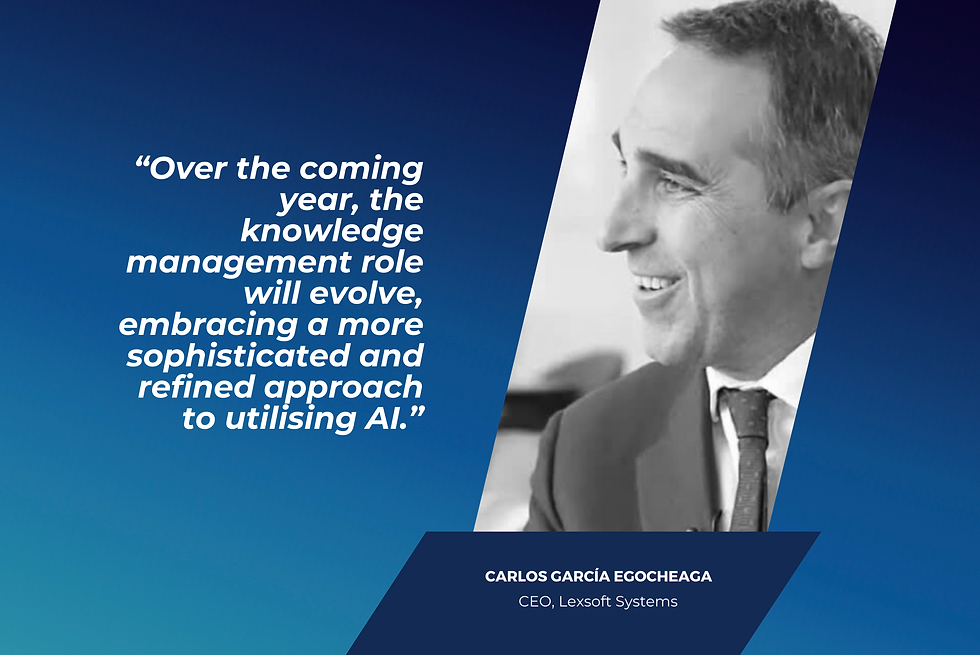The legal business and its new algorithms
- May 26, 2021
- 4 min read
Updated: Jun 1, 2021
Iván Jiménez,
Innovation and transformation manager at MUTUALIDAD DE LA ABOGACÍA

I propose to take a trip in time, just for a few moments, before dissecting the world of algorithms. Take a moment to think about what the legal sector was like before the disruptive new technologies came along. As one of the oldest professions, dating back to ancient Greek civilization, it has inherently maintained its artisan, intellectual essence. Now freeze this image and look into the future in a non-linear way.
At different times, new market rules, politics, and social factors have shaped the legal industry. Today it is technology rules and patterns that, together with social and cultural trends among clients, are changing the shape and outlines of our field. We are talking about a new value and how we interpret technology in a new role for us, mixing the "artisan" with the digital.
In common with other industries, the legal sector is affected by incipient changes and accelerators, but essentially there is one technology that stands out from the rest. A "technological disruptor" that will predominate in the coming years, transforming the value chain to introduce algorithmic changes into key activities. We are talking about boosting our business model by exploiting data (the oil of the 21st century). And the motivation to seek technological solutions to help broaden the process of using data has to do with their complexity in this field. According to IBM, 2.5 trillion bytes of data are generated in the world every day, a quantity of information that cannot be assimilated even in a structured form by human beings unless we refine and connect the data to a complementary intelligence.
The legal sector switching from zeroes to ones
The objective of these organizations in the legal sphere will center on taking better decisions (calibrating risks, better opportunities with clients, assessing the value of contracts more accurately and so on) using data, to which end they will use a data-driven culture as a strategic lever. The focus will be placed on apparently unstructured, patternless information in whatever form (contracts, litigation, cases, etc.), and, using algorithmic functions, we will be able to multiply their value and offer competitive advantages. Seeking value intersections and perspectives to enable us to see what others cannot interpret.
As Peter Thiel proposes in his book "Zero to One", we will seek exponential technologies and algorithms to quantify our business model, wherever our value chain is "hackable" or wherever we can exponentially multiply the value we add for our clients. Artificial Intelligence in all its disciplines (Machine Learning, Deep Learning, Neural Networks, etc.) is, without doubt, a differentiator in the legal sector and, like any "superpower", we must be ready and trained to use it in the digital era. New skills call for new abilities and roles to implement. In this new legal world, being digital forces us to think about how to develop and hybridize exponential abilities and fit them into the company's key activities.
The keys to hybridization are our own data skills and the skills in the innovative ecosystem; choosing the right accelerators, startups, or enabling technologies can be a competitive advantage in adopting exponential knowledge. Establishing a balanced strategy for internal and external technology-related skills is a differential value that makes it possible to achieve differentiation earlier and further.
Key activities, algorithmic roles and data
In this joining of new abilities and roles it will be important to add new internal skills for the implementation phase of a new legal organization, based on a series of key activities that must be prominent in the transformation towards an algorithmic, data-driven organization:
Legal Tech Ecosystem to identify what the tech industry is doing with data in the legal sphere and what tools are helping with the implementation process. The market is feeding on quick-wins that do not require technological efforts or specialist knowledge of AI, Machine Learning and the like, and that offer significant results in terms of efficiency and new added value.
Legal Data Analytics to decipher data from many different standpoints, using the results of trials, testimony, court decisions, official documents, contracts, news, and so on in order to detect value, risks and opportunities by connecting data that are not immediately obvious.
Legal AI Training; to implement AI technologies in organizations often calls for teams trained for this purpose to then refine the results. Custom AI tools for your organization require your teams to be trained in resilience and "artificial" knowledge in order to give them a competitive advantage in your process.
Legal Hybrid Performance; to get the best results from new key activities, "machine vs. human" profiles will need to be redefined. Maximizing value from both points of view, not just for the sake of efficiency but to boost the value we deliver to clients. The process and human resources areas are vital to this new reality.
Legal and AI Ethics Advice; to protect the core pillars of legal work, it is essential to reinforce and supervise the automation of decisions with AI. To this end, establishing the basis for supervision, training, design principles, decision-making models, the technologies used and transparency will be one of the foundations on which to construct an algorithmic strategy.
Legal Algorithm Culture to define the what, how and why of algorithms and data use in the company's legal sphere. Placing at the center of the business the creation of a mindset to build synergies, in order to work together to achieve more in managing people in the organization and its clients by using the technology that can differentiate the legal business.
If one thing makes the legaltech sector attractive in the coming years it will be the challenge facing the industry in transforming and exploiting data algorithms. We are probably talking about one of the industries that generate the largest quantity of unstructured information and at the same time spends the most time searching for, refining and analyzing it in order to draw key conclusions. This fact is a disruptive opportunity and a major challenge for the community of startups that are working to create synergies with the legal industry in the search to generate new competitive advantages.
The key activities listed in relation to algorithms and data, together with the technological muscle of startups, should usher the sector into a new future characterized by knowledge about clients and a better value proposition to set us apart.
The future of legal algorithms is coming.




Comments